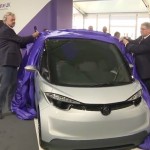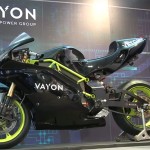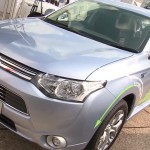The largest low carbon vehicle event, held at Millbrook Proving Ground, got off to a great start today with several announcements to whet the appetite of any person interested in electric, hybrid, fuel cell and other alternative technologies.
Professor Gordon Murray teamed up with Innovate UK Chief Executive Iain Gray CBE to reveal Yamaha’s Formula One inspired MOTIV.e car, the first time the car has been revealed in Europe. Yamaha Motor Company chose Gordon Murray Design to work in partnership on the design and development of MOTIV.e which utilises Gordon Murray Design’s revolutionary iStream® manufacturing technology.
AutoVolt will soon be publishing an article about iStream® in our bi-monthly magazine. The process incorporates Formula One composite technology and enables a much smaller factory to produce vehicles that delivers new levels of safety, vehicle dynamics while having a low environmental impact. It is a revolutionary approach to vehicle mass production and one which deserves explanation.
Meanwhile, Mitsubishi were proud to launch their Outlander PHEV Commercial vehicle which is akin to other vehicles in its class that have been converted to ‘van’ like use, for example by blanking out the rear windows amongst other alterations to the Outlander PHEV car version.
BMW are one of the LCV event sponsors and thus their presence was made clear, not that they needed to draw much more attention to their striking i3 electric car or i8 hybrid sports car.
Volkswagen had a large presence too, with their fleet of all electric e-Golf’s and e-up!’s plus the beautiful XL1 hybrid on show too.
Vayon are a new company who were using the LCV event as a launch platform to spread awareness of what they do. Amongst their display was Kingston University’s electric motorbike which raced at the Isle of Mann this year, for which Vayon supplied technical support. Vayon specialises in Battery systems, chargers and battery pack integration.
Continuing the University theme, the University of Bath has been awarded £2m of equipment funding from the Engineering & Physical Sciences Research Council (EPSRC) to establish a UK centre of excellence in low carbon vehicle research. The aim is to educate future engineers in order to progress the furtherance of reducing emissions and increasing efficiency while having less impact on the environment.
Magtec and the Lightning GT, a British electric car with serious performance potential, were also on display. Magtec is an electric powertrain company who have a background in military vehicles but who have recently made the move to more mainstream projects, such as supplying the electric motors for the Lightning GT and an electric powered open top double-deck bus, which is currently being trialled as a sightseeing bus in York city centre.
Aside from the many electric and hybrid specialists, several companies, such as Intelligent Energy, are working on fuel cells. Despite the current lack of infrastructure in place, each company is convinced fuel cell technology is ready for today. That may not necessarily mean in vehicles either as Intelligent Energy will soon be bringing to market a miniaturised version of their technology, which provides 5W power to charge USB devices. We aim to bring you more information on fuel cells in an upcoming feature within our bi-monthly magazine.
There are many more companies and far too much information to share, showcasing their wares and exciting innovations at the show. We’ll be back there tomorrow to get more insight into tomorrow’s vehicle technology.



